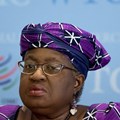Moody’s recent decision to downgrade China’s A1 credit rating outlook from stable to negative has ignited a maelstrom of opinions within financial circles.

Source: Supplied. Fred Razak, chief trading strategist at CMTrading.
Amidst concerns surrounding reduced inflation, stalled productivity growth, and allegations of political interference in regulation, Moody’s stance has drawn fierce rebuttals from Chinese authorities, who assert bias in the agency’s assessment.
Offering a nuanced perspective, Fred Razak, chief trading strategist at CMTrading, dissects the implications of Moody’s verdict and elucidates potential repercussions for China’s economic trajectory.
The verdict: fair or unreasonable?
“Moody’s enjoys widespread credibility in financial circles, yet no institution is immune to occasional missteps,” Razak acknowledges. China currently confronts various challenges, ranging from demographic transitions to state intervention in economic affairs.
“When critical components of an economic powerhouse falter, it reverberates across the entire system,” Razak observes.
Moody’s concerns regarding China’s ability to achieve its ambitious 5% GDP growth targets underscore the multifaceted nature of the nation’s economic landscape.
“Predicting China’s economic trajectory entails navigating a labyrinth of domestic and international factors,” Razak explains. “Variables such as oil-price fluctuations and geopolitical tensions profoundly influence China’s economic performance. Prematurely dismissing its growth targets overlooks the intricate interplay of these factors.”
Government policy and market implications
Despite Moody’s apprehensions, the Chinese government remains resolute in its policies. Razak contends that market participants have already assimilated the interventionist nature of China’s governance structure into its investment strategies.
“China’s governance model, characterised by a unique fusion of communism and capitalism, is familiar terrain for investors,” Razak asserts. However, he underscores the broader geopolitical ramifications of Moody’s downgrade. “Beyond the economic realm, the crux of the matter lies in fostering harmonious co-existence between the US and China.”
Recent diplomatic engagements between the two nations hint at a tentative de-escalation, yet the long-term trajectory remains shrouded in uncertainty.
“Sustained growth hinges on stability and mutual respect among nations. As the global economy emerges from the pandemic-induced quagmire, advancements in AI present promising avenues for growth. However, navigating the volatile geopolitical terrain necessitates vigilance,” says Razak.
Navigating China’s economic crossroads
Razak delves into the intricacies of China’s economic landscape, highlighting the confluence of factors shaping its trajectory.
“China’s economic narrative is a tapestry woven from diverse threads.
Demographic shifts, technological advancements, and geopolitical manoeuvring converge to mould its economic destiny. The downgrade reflects concerns over China’s faltering productivity growth and escalating political entanglements.
“The Chinese economic juggernaut faces headwinds. Yet, amidst the turbulence, opportunities abound for astute investors attuned to the nuances of the Chinese market.”
Charting a path forward
Razak advocates for a nuanced approach to navigating China’s economic crossroads. “In an era defined by uncertainty, adaptability is the currency of survival. Investors must remain agile, recalibrating their strategies in response to evolving market dynamics.”
While Moody’s downgrade underscores prevailing concerns, Razak remains cautiously optimistic about China’s economic prospects. “China’s resilience is a testament to its adaptability.
"As the world’s second-largest economy, China commands attention and warrants strategic consideration in any diversified investment portfolio.”
As Moody’s verdict still reverberates across financial markets, Razak urges stakeholders to adopt a balanced perspective. “Assessing China’s economic trajectory demands a holistic lens.
"While challenges abound, China’s enduring resilience and capacity for innovation inspire confidence. Navigating the economic landscape requires a blend of prudence and foresight, tempered by an unwavering commitment to sound investment principles.”





























